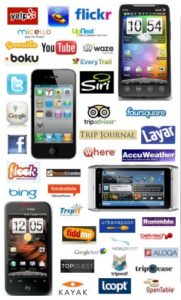I’m Mad as Hell About Hidden Airline Fees and I’m Not Gonna Take This Anymore is the tag line for a coalition that is demanding that the US Department of Transportation requires airlines to prominently display all ancillary fees on their websites and to provide distribution to enable transaction of these fees through all third party channels. Upon closer scrutiny, several claims appear exaggerated, while the lack of specific proposals regarding HOW these demands can be effectively implemented ignores challenges involving business models and technical interfacing.
HITEC Presentation: Mobile Distribution – No, It’s Not Billboards and Neon Vacancy Signs
It was great to see that attendance rebounded healthily at the annual Hospitality Financial & Technology Professionals HITEC conference, held in Orlando, Florida June 21 – 24, 2010. The good news was that I had been selected to speak on a subject that combined two of the hottest topics in technology and travel: Mobile Hotel […]
Individualization of Travel – ITB Berlin Convention
Text of opening remarks by Robert Cole when moderating the Individualization of Travel panel on March 12, 2010 on Marketing & Distribution Day at the ITB Berlin Convention. Key takeaways included travel is both an intensely personal and highly social experience. It is also a very complex multi-step process. A massive quantity of potential options exist, as well as dramatically different personal decision making processes. Now, social media now enables a transition from mass broadcasting brand messages to establishing relationships with customers and interactively communicating.
Smarter Travel Agents and Travel Agencies Rise from the Ashes
The travel agency community has sustained significant losses due to consolidation and the economic downturn. A new breed of smarter and more innovative travel agencies have emerged that understand customer needs, provide specialized travel product knowledge, and creating travel plans best fit those needs. These are the traditional traits of quality travel agencies. The difference is that these new agents have embraced technology and used it to expand their reach, engage their customers and grow their revenues.
Wynn Resorts Becoming “More Chinese” With Hong Kong IPO
Wynn Resorts is selling 25% of its Wynn Macau property for an estimated $1.5 Billion through an IPO next month. The Financial Times is reporting that this is the first time an American company has issued shares on the Hong Kong Stock Exchange. Steve Wynn, the man responsible for redefining the Las Vegas strip 20 years ago, is quoted as saying he would like Wynn resorts to become “more of a Chinese company.” There is good reason for this strategy – Macau is already the world’s largest gaming market, with gambling proceeds doubling those of Las Vegas. By successfully integrating Chinese perspective and sensibilities into the product, marketing, operational and now financial aspects of his casinos, Wynn Resorts’ chairman is positioning the company to benefit from a growing market of Chinese players over the next 20 years.













